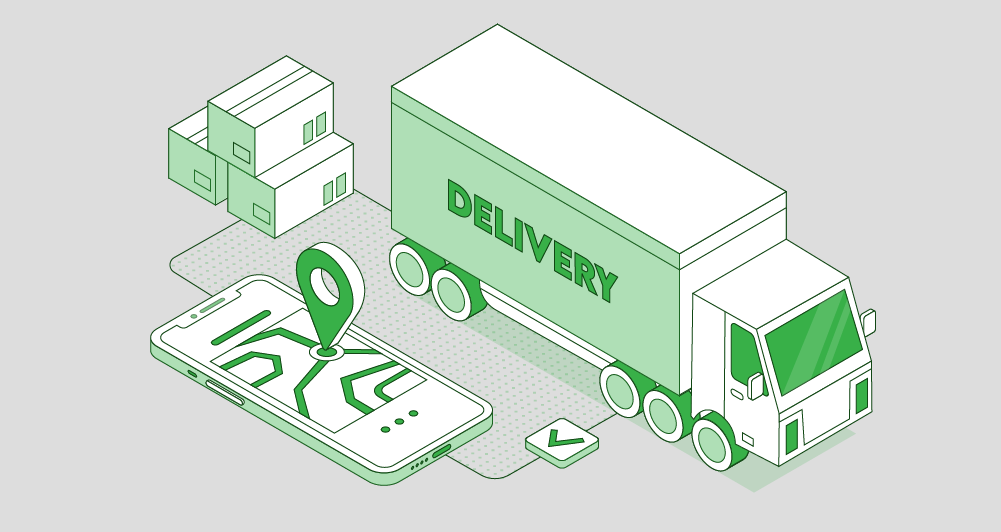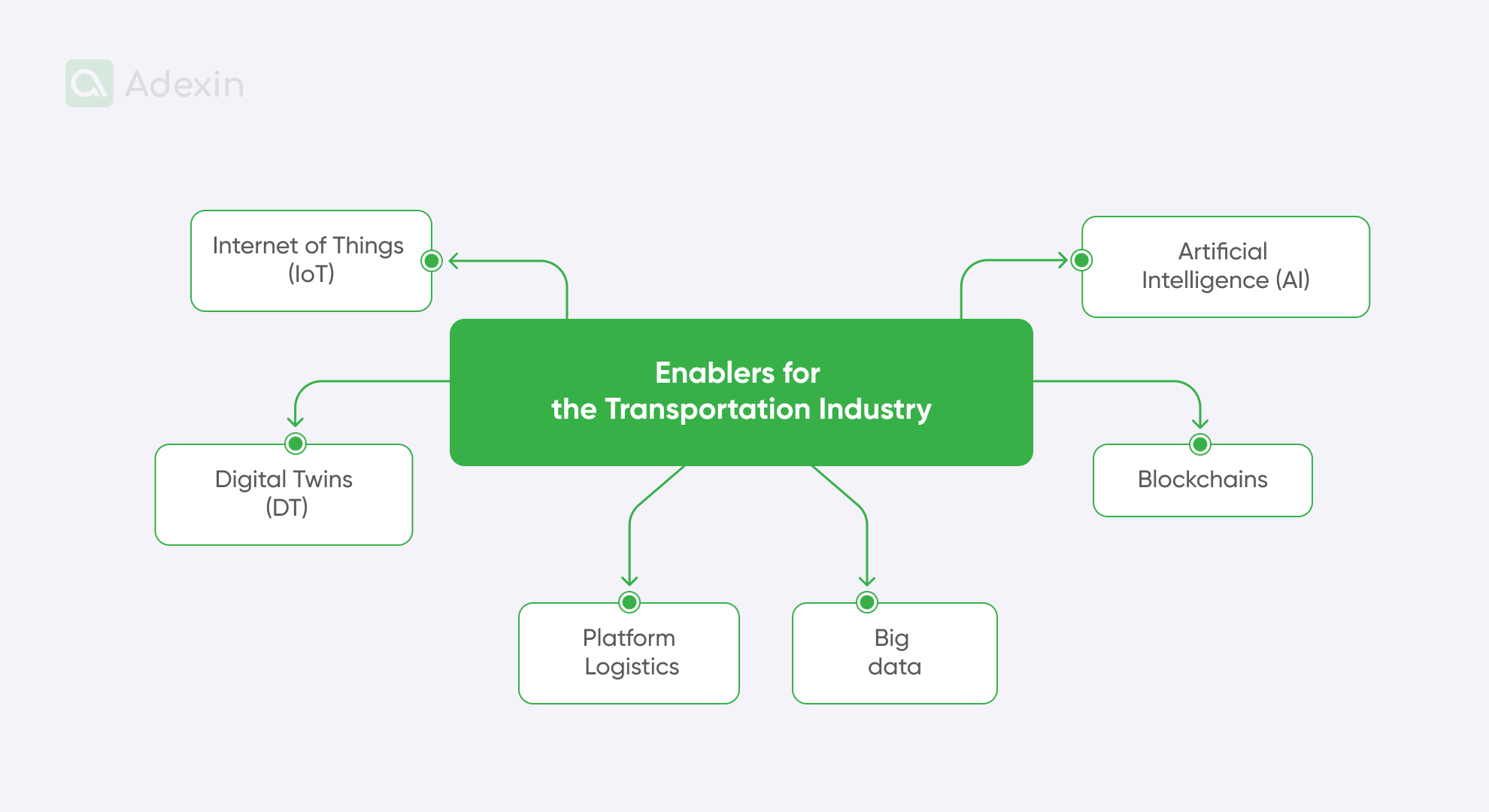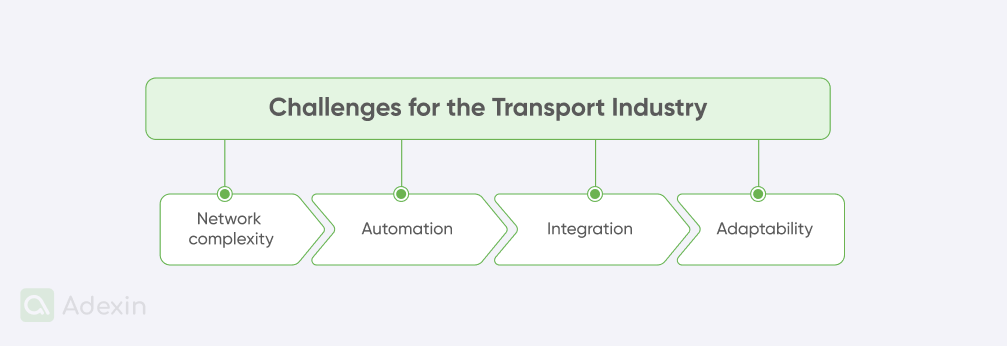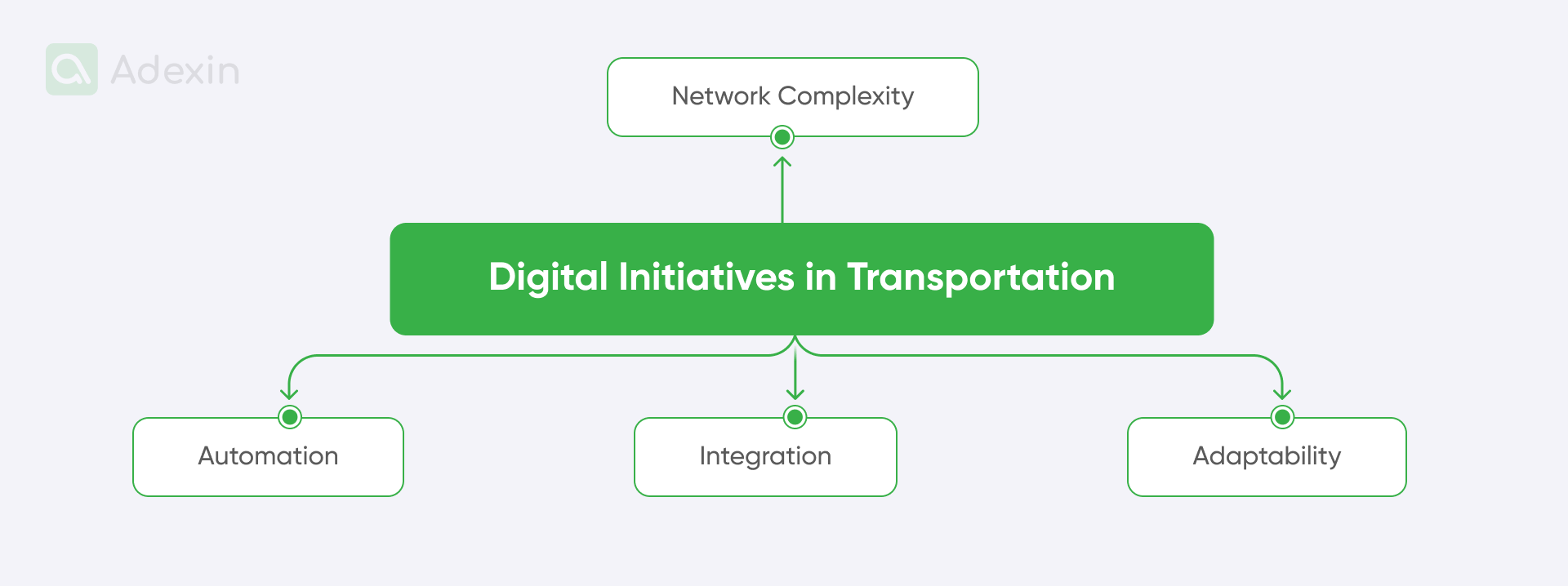Are digital initiatives changing the transportation industry? Undoubtedly, yes, and solutions such as digital proof of delivery (POD) to IoT and AI integration technology are revolutionizing logistics every day. Logistics companies want to improve safety efficiency and want to increase their adaptability in an ever-changing environment. Read the article below and see the key enablers for logistics, including IoT, AI, Digital Twins, Platform Logistics, Big Data, and Blockchains. Knowledge of these broad technology aspects can help you overcome challenges such as network complexity, automation, integration, and many more. Become agile in transportation management and leverage digital transformation in your logistics business with us.
The Digitalization Impact on the Transport Industry
Digital developments in the transportation industry are shaping the structure of today's logistics. Frankly speaking, modern transportation is nurtured by digital initiatives that bring vital transformation to the entire supply chain. We anticipate this as an ongoing trend in every corner of today's logistics.
We can imagine a truck driver with a mobile device in hand walking across a warehouse parking lot to the driver entry point at the reception to sign a digital proof of delivery (POD). After getting the confirmation from reception, the validated POD with a digital signature is distributed via cloud technology to all company branches and stakeholders. In this way, anyone in front of a computer or mobile device can access the data anytime.
The above example sounds quite technical, but this is a real-life case that pronounces how digitalization impacts the transport industry with swift data exchange and easy access, which has implications for almost every aspect of supply chain operations. Simply saying, whatever improvement is done in the supply chain is the ultimate enabler for the global flow of transported goods in the transportation industry.
How Technology Is Changing the Transportation Industry?
Digitalization is very crucial for transportation because it doesn't only bring direct value to the physical assets of the company, like trucks and trailers management, but it also influences the surrounding flows of activities from planning through finance, providing security to your organization.
The last mentioned advantage for the truck transportation industry is security for end-to-end operations, which is anticipated in freight shipping through timely delivery. Simply saying, shipment security ensures the highest customer satisfaction, something no company can afford to lose. On the other hand, security will also implicate data safety when exchanging information and protecting businesses against malicious practices.
Emerging technologies are driving digital transformation in transportation. They enhance business performance and create value, helping with information processing, which is the key stakeholders' major need in every supply chain operation. With that said, increasing digital capabilities in your organization can have a significant rate of advancement for transportation.
Technology that applies to transportation can be seen in two ways. One is related to social & business trends where the most market-impactful advanced developments are digital marketplaces or sustainable solutions with decarbonization. The second cluster is created just by digital technology trends, which are finding direct usage in transportation. These are, among others, Big Data, Next Generation Wireless, Digital Twins, and Interactive AI.
Implementation for each with the aforementioned solution can take up to 5 years before we can think about ROI. [1] They have also been implemented to some extent at some leading industrial companies, such as UPS, DHL, and FedEx, which rely closely on transportation innovation driven by digital initiatives.

What Are Enablers for the Transportation Industry?

Digital technologies are the ultimate enablers for the transportation industry. Here are the most well-known technology concepts already being implemented for the transportation industry, along with supporting software:
Internet of Things (IoT)
IoT is supporting a range of applications in transportation, including transport management systems, real-time routing, dynamic vehicle scheduling, trailer and container management, intermodal transport and general shipment management. One of the most important functions today is radio frequency identification (RFID). The feature is built into transportation software that streamlines simple tasks for transportation and mobile devices.
IoT technology is crucial for international and intercontinental shipments as deploying its features into day-to-day operations can ensure quality data collection and help forecast demand trends, as well as overall optimize performance.
Artificial Intelligence (AI)
AI facilitates transport and Industry 4.0. I. If we look at today's technology, advanced software solutions are becoming more common. They allow for the extended integration of artificial intelligence-based transportation modules that are built into route planning systems. So it's worth to know that AI intelligence provides machine learning, improving truck performance, lower fuel consumption. The most significant impact of artificial intelligence on the transportation industry can be seen in the development of autonomous vehicles (AVs), but these are now only commonly used in warehouses. However, it will also be widely deployed on roads and visible in traffic in nearest years. It may also involve the development of self-flying electric drones, a technology already developed by Amazon [2].
Digital Twins (DT)
Disruptive technologies like Digital Twins combine AI and IoT to provide machine learning capabilities and predictive analytics built-in simulation software. This solution allows for strategic development with communication infrastructure between real-world physical devices. It enables connections between computer systems, vehicles, AVs, trucks on the road, flying drones, and specific activities, mainly supporting development and testing before implementing any costly solution. This can directly assess the need for a certain solution in transportation and validate if it's needed or not or for some time in the future.
Platform Logistics
Web-based platforms can have built-in marketplaces where you can choose the most appropriate way to ship goods with the carriers of your choice. One of the best functions is that such a platform can have a transportation tracking system, and what's more, you can immediately share online EDI with carriers. Platforms can offer capabilities for truck owners' assistance in applications available across different devices. These platforms may also help in separate fields of transportation, such as those dedicated to shipping document management based on blockchain technology, allowing for paperless documentation like digital POD, invoices, and shipping documents transmitted online. With platforms, you can stay competitive and have insights into market intelligence data useful for benchmarking an organization against its competitors.
Big data
Technology that allows the utilization of vast portions of data within the interconnected environment of various devices. It goes far beyond typical software for data processing as it combines the capabilities of cognitive computing systems for advanced predictive analytics. Data system designed in that way helps process customer interactions from order to delivery combined, improving transport management and human resource management. The Big data influence broadly influences mobility and logistics sectors, generating approx. 15% of GDP worldwide, and its value goes over 500 billion USD. [3]
Blockchains
This is an interconnected network of computers, usually called nodes, each of which is part of a blockchain. This technology provides a method of bookkeeping, allowing unconnected parties to reliably transfer data between two interested parties while using consensus algorithms. This advanced solution can help centralize large databases and eliminate intermediary systems in transit designed for data management. A centralized solution leads to significant cost savings.
Need help with digital transformation for your transportation business?
Learn how we can help you
Explore moreChallenges for the Transport Industry

A series of grand challenges in the transportation industry are related to those that cannot be tackled in a short time. Today, companies need greater state control over transportation, and they are often unable to rapidly adapt to changes in competitive commercial environments. Beyond these challenges, several fragmented problems may impact smooth transport operations. Here are some of them:
Challenges | Description |
|---|---|
Digital Initiatives in Transportation

Network Complexity
Implement a Logistics Platform
To deal with the complexity of the network, you can invest in a robust digital supply chain platform that offers real-time visibility and collaboration tools.
It is important to ensure high-quality information flow by centralizing data and digital document handling on this platform.
A good software provider can help with the implementation of seamless communication and data sharing between carriers, logistics partners, and supply chain members. Logistics software companies can also enable some extra features that help with advanced analytics to predict and proactively manage uncertainty and dependencies in the network.
Automation
Create Workflow Automation
You can look at how to streamline business operations by automating key supply chain workflows and transportation processes. Implement automated data exchange to reduce manual errors and speed up document handling.
Find software solutions that use automated route planning and truck tracking tools to improve traceability. Think about how to use IoT (Internet of Things) technology to monitor assets in real time, increase efficiency, and reduce operating costs.
Integration
Deploy Integration Framework
You may consider implementing a comprehensive integration framework that connects various stakeholders in the transportation industry. It should have built-in Electronic Data Interchange (EDI) capabilities for standard data exchange but also incorporate more advanced data integration methods.
Don't forget to ensure seamless two-way communication between internal systems, including legacy ERP systems, and modern software functions. Finally, think about investing in flexible middleware software solutions to bridge the gap between disparate systems, supporting collaboration and data synchronization.
Adaptability
Arrange agile Transport Management Strategies and Systems
You can develop agile transportation management strategies within Transport Management Systems (TMS) that can also respond quickly to market fluctuations and ever-changing demand.
You may find useful access to systems that offer predictive analytics to forecast market trends and optimize transportation resources.
At that point, it will also be important for you to establish flexible relationships with carriers and logistics partners to move towards capacity constraints. Advanced planning systems allow the use of dynamic routing and scheduling algorithms to adapt to real-time conditions and reduce lead times.
Are you in search of a reliable tech partner?
Adexin can help with advanced logistics solutions
Contact usDriving Conclusion
The technologies discussed above can transform transport, logistics, and supply chain management and will be greatly important when exploring new business opportunities. We should never forget that implementing a digital solution in your company should help optimize existing resources, making your organization more profitable. Along with optimizing the current state of your company's resources, additional digital developments of capabilities may come to meet the challenges ahead.
Introduced digital concepts for the transportation industry are significantly competitive and deliver sustainable advantages to the organization. Once leveraged and exploited more widely, digitalization doesn't seem difficult to initiate. Thus, to succeed in the transportation industry, companies can consider exploring emerging technologies and disrupting the status quo with digital initiatives. Modern businesses should even penetrate new areas to make operations more profitable, delivering benefits including higher service speeds, greater reliability, lower operating costs, and improved efficiency.
It can be much easier for you to implement one of the technologies if your company can find a reliable partner that has in-house capabilities to guide you on the digital journey to improve your transport operations.
Adexin has a proven path of implementation for the transportation industry and can help your organization better adopt digital solutions. We understand how interoperability between various systems influences overall performance, so we can advise you on which technologies could be or would be adopted in a particular field of transportation. Don't hesitate to book a short introduction meeting with us. Let us guide you through the broad landscape of digital transportation.
References:
[1] The Logistics Trend Radar, retrieved from: https://www.dhl.com/global-en/home/insights-and-innovation/insights/logistics-trend-radar.html
[2] Artificial Intelligence the next digital frontier? Retrieved from: https://www.mckinsey.com/~/media/mckinsey/industries/advanced%20electronics/our%20insights/how%20artificial%20intelligence%20can%20deliver%20real%20value%20to%20companies/mgi-artificial-intelligence-discussion-paper.ashx
[3] Transforming Transport: retrieved from https://cordis.europa.eu/project/id/731932

